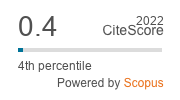Suppression of growth and endopeptidases of red palm weevil,Rhynchophorus ferrugineus (Olivier) infesting coconut using proteinase inhibitors
DOI:
https://doi.org/10.33307/entomon.v41i4.214Keywords:
Rhynchophorus ferrugineus, gut proteinases, proteinase inhibitors, aprotinin, soybean trypsin inhibitorAbstract
Investigations on luminal proteinases of grubs of red palm weevil, hynchophorus ferrugineus (Olivier) infesting coconut revealed presence of two endodpeptidases viz., trypsin (BApNA-ase activity) and elastase-like chymotrypsin (SAAPLpNA-ase activity) in all stages of larval development. Highest activity of these proteinases coincided with the active feeding stage (mid-larval stage) of the insect. Aprotinin 50 ìg, Soybean Trypsin Inhibitor (SBTI) 50 ìg and Phenyl Methyl Sulphonyl Fluoride (PMSF) 1700 ìg inhibited trypsin activity of R. ferrugineus by 77.4%, 63.1% and 55.9%, respectively. Serine proteinase inhibitors viz., aprotinin (50 ìg), SBTI (50 ìg) and PMSF (1700 ìg) had a marginal reduction of elastase - like chymotrypsin activity of R. ferrugineus by 32%, 14% and 11%, respectively suggesting the serine nature of the proteinase. In vivo bioassay of 250 ìM aprotinin on coconut petiole method using early stage grubs of R. ferrugineus indicated a significant weight loss of 18.9% due to incorporation of serine proteinase inhibitor, aprotinin in a period of 120 h. Possibility of using serine proteinase inhibitor, aprotinin in the management of R. ferrugineus was suggested.Â
Downloads
Published
How to Cite
Issue
Section
License
Copyright (c) 2017 ENTOMON

This work is licensed under a Creative Commons Attribution-ShareAlike 4.0 International License.


